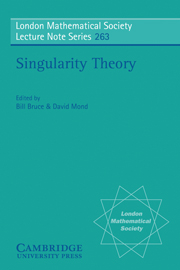 Singularity Theory
Singularity Theory Book contents
- Frontmatter
- Contents
- Preface
- Introduction
- Summaries of the Papers
- Complex Singularities
- Stratifications and Equisingularity Theory
- Differential Forms on Singular Varieties and Cyclic Homology
- Continuous Controlled Vector Fields
- Finiteness of Mather's Canonical Stratification
- Trends in Equisingularity Theory
- Regularity at Infinity of Real and Complex Polynomial Functions
- Global Singularity Theory
- Singularities of Mappings
- Applications of Singularity Theory
- References
Finiteness of Mather's Canonical Stratification
Published online by Cambridge University Press: 05 May 2013
- Frontmatter
- Contents
- Preface
- Introduction
- Summaries of the Papers
- Complex Singularities
- Stratifications and Equisingularity Theory
- Differential Forms on Singular Varieties and Cyclic Homology
- Continuous Controlled Vector Fields
- Finiteness of Mather's Canonical Stratification
- Trends in Equisingularity Theory
- Regularity at Infinity of Real and Complex Polynomial Functions
- Global Singularity Theory
- Singularities of Mappings
- Applications of Singularity Theory
- References
Summary
Introduction
In [5, 6, 7], Mather showed how to construct a “canonical” Whitney-regular stratification of jet-space, with the property that a proper map whose jet-extension is multi-transverse to the stratification is topologically stable. (An alternative, rather simpler, presentation of this result is given in [2].)
Mather also claimed, in [7], that the stratification constructed has only finitely many connected strata. This is of considerable interest because the topological type of a map-germ transverse to a (connected component of a) canonical stratum is determined by the stratum, so the claim implies that there are only finitely many topological types of topologically stable map-germs in any given dimension-pair.
Unfortunately, Mather's proof [7, p.170] of this finiteness is not correct. The aim of this article is to give a correct proof.
We give this proof in §2. In §1 we give the necessary background; in particular we describe a construction for the canonical stratification rather simpler than both Mather's and that given in [2].
The arguments given here were originally worked out for the review section of the book [9], see in particular pp. 44–5, but in the event were not included there.
I thank Terry Wall for help with the preparation of this article.
- Type
- Chapter
- Information
- Singularity TheoryProceedings of the European Singularities Conference, August 1996, Liverpool and Dedicated to C.T.C. Wall on the Occasion of his 60th Birthday, pp. 199 - 206Publisher: Cambridge University PressPrint publication year: 1999


